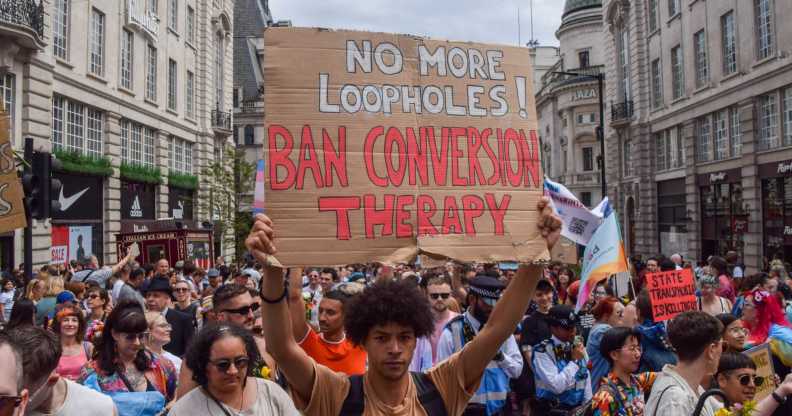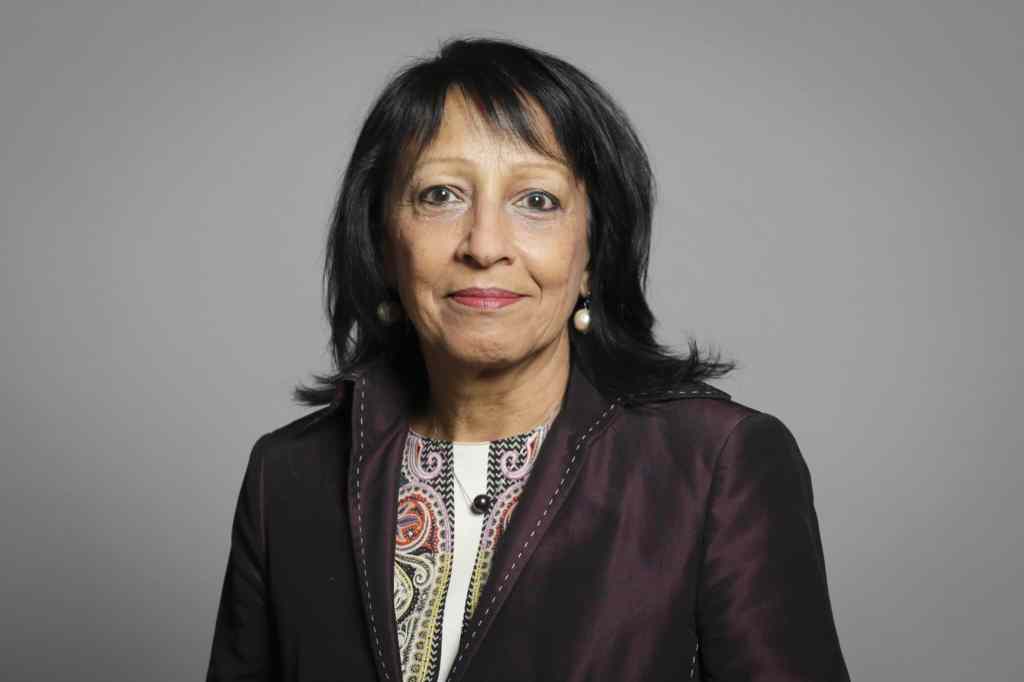EHRC demands government implement trans-inclusive conversion therapy ban

Tory MPs are furious at the delay on banning conversion therapy. (Vuk Valcic/SOPA Images/LightRocket via Getty Images)
The UK’s equality watchdog has called on Rishi Sunak to introduce a trans-inclusive ban on conversion therapy in the King’s Speech.
The demand from the Equality and Human Rights Commission (EHRC) comes after scrutiny of the body’s work, its internal practices and, in particular, its stance on transgender rights.
In a letter to the secretary of state for women and equalities, Kemi Badenoch, EHRC chairwoman Baroness Kishwer Falkner wrote that the watchdog has “long been supportive” of banning “harmful” so-called conversion therapy.
Former prime minister Boris Johnson previously sparked concerns when he said his plans for a ban would not include trans people.
However, a spokesperson for the EHRC confirmed to PinkNews that Baroness Falkner is now calling for a trans-inclusive ban.
Falkner said that banning the practice is a “complex and sensitive area with the potential to have wide-ranging impacts”, and “legislation should be carefully considered to ensure it uses clear terminology and definitions, and is proportionate and evidence-based”.
Conversion therapy, or practices, is the act of trying to alter someone’s sexuality or gender identity through prayer, verbal and physical abuse and/or “corrective” rape. It has been discredited by every major medical and psychological body in the UK, and activists have campaigned for years to have it outlawed.
Ending conversion therapy has been a long time coming. The Tory government officially promised to ban it under Theresa May’s leadership in 2018 but since then – and three prime ministers later – there have been delays, U-turns and controversial policy leaks, with no legislation materialising.
In January, the government said it was planning to publish a draft bill “shortly” but that has still not appeared.
Falkner continued: “The commission’s position remains that legislation to ban harmful conversion practices is needed, and that thorough and detailed scrutiny remains imperative to ensure that any ban is fully effective in protecting people with the protected characteristics of sexual orientation and gender reassignment from harm while avoiding any unintended consequences.
“I hope to see this legislation in the forthcoming King’s Speech [on 7 November]. We, of course, remain happy to engage and provide advice if required on the equality and human rights implications of any proposals.”
EHRC criticised by trans community
The EHRC’s call for a trans-inclusive ban follows a period of increased criticism from transgender activists and the wider LGBTQ+ community.
In recent months, the equality watchdog has issued new guidance and provided policy advice to the government. Most controversially, in April, the EHRC published a letter advocating for the category of sex as a protected characteristic to be defined as “biological sex” under UK equality law – a move which left trans people “horrified” and fearing for their legal rights.
At the time, in correspondence with Badenoch, Falkner stated that there “is no straightforward balance”, but believed defining sex as “biological sex” would “bring greater legal clarity”.
The areas, she said, in which it would bring such clarity included making it easier to “exclude trans women from women’s sport” and from single-sex spaces.
In the weeks that followed, trans people’s fear appeared valid after a statement from UN independent expert on sexual orientation and gender identity, Victor Madrigal-Borloz.
He expressed shock that the EHRC did not actually have a definition of biological sex.
“UK law provides no such definition either,” he said. “The EHRC, however, specifically conceded that, in the context of the letter, the intended meaning of the term ‘biological sex’ is to define women as ‘women who are not trans’.”

More recently, the body faced a backlash for updating its guidance for schools, to say that teachers who misgender pupils are not guilty of discrimination.
The update to the EHRC’s Technical Guidance for Schools in England replaced a previous document published in 2014 and removed an entire section which stated that misgendering is discriminatory under the 2010 Equality Act.
The new guidance also added single-sex toilet facilities must be provided for children above the age of eight, and single-sex changing facilities for children older than 11.
It advises schools that these spaces should be segregated by biological sex rather than gender, meaning transgender pupils would not be allowed to use the toilet or changing room which aligns with their gender identity.
Instead, the guidance says trans pupils should be provided with private changing facilities.
This update came while the government was working on its own trans pupil guidance, with leaks suggesting teachers could be forced to out trans youngsters to their parents and guardians, while social transitioning could be banned in schools.
The controversy has not been focused solely on the EHRC’s policy advice though, as the watchdog’s internal practices and policies came under fire earlier in the year amid accusations of bullying and transphobia.
Vice News reported that a number of senior staff, including a board member, an executive director, four other directors and a committee member, had stepped down because the organisation had become “more and more transphobic”.
The EHRC was going in an increasingly “transphobic direction”, according to one member of staff.
“The EHRC is having a really damaging impact right now,” they claimed. It’s sending a strong message to trans people that your rights don’t matter.”
How did this story make you feel?

